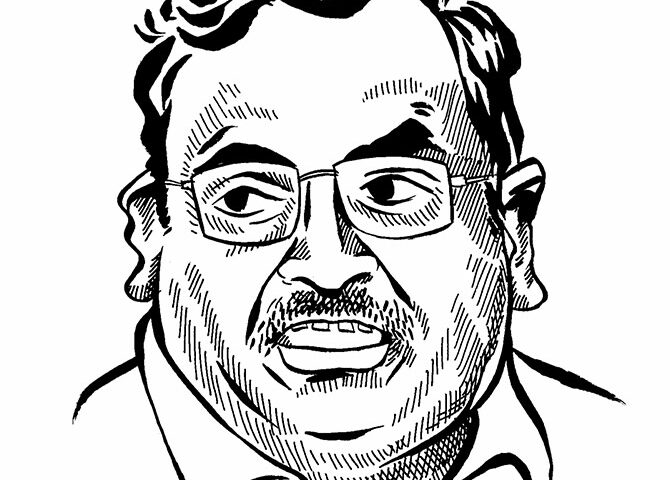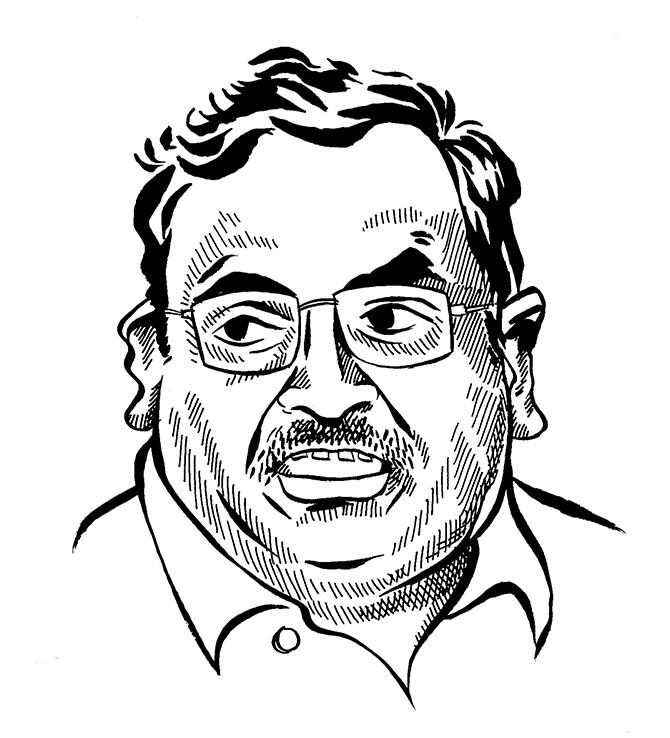‘Saibaba has 19 ailments, including severe heart and kidney problems.’
‘Even healthy persons find their systems failing after Covid.’
‘What will happen to someone like Saibaba?’, Professor G N Saibaba’s wife asks Jyoti Punwani.
Their worst fears have come true. Professor G N Saibaba, serving a life sentence in Nagpur Central Jail, has tested positive for COVID-19.
And, going by his wife Vasantha Kumari, he has it bad.
“Saibaba called today (Saturday) and could speak with great difficulty. We could make out he was breathless, his throat was sore,” she told Rediff.com.
Professor Saibaba has been experiencing joint pain, high fever, and a blocked nose since the last few days, said Vasantha Kumari. He called her on January 9 to tell her about these symptoms and request that the jail authorities be asked to test him for Covid.
The test was carried out after Vasantha sent the jail superintendent an e-mail. The results came positive on the evening of February 12.
Covid for Professor Saibaba is different from Covid for anyone else.
90% handicapped since childhood because of post-polio paralysis, the professor’s health has deteriorated sharply during the five years he has spent behind bars the last four without bail or parole.
The Delhi University Professor of English was convicted of having Maoist links in March 2017, and has since been denied bail and parole. Norms of evidence were brazenly flouted during the trial by the Gadchiroli district and sessions court.
In a letter to Maharashtra Chief Minister Uddhav Thackeray, Vasantha and Professor Saibaba’s brother Dr Ramadevudu have requested that the rofessor be moved to a private hospital immediately.
“The Nagpur government hospital has no facility for wheelchair bound patients,” said Vasantha anxiously. “Saibaba has faced tremendous difficulty accessing the bathroom there.”
Besides, she added, “A government hospital is a hub of infection. Saibaba has 19 ailments, including severe heart and kidney problems. Even healthy persons find their systems failing after Covid. What will happen to someone like Saibaba?”
Vasantha e-mailed the letter on Saturday afternoon to Chief Minister Thackeray’s e-mail id given on the government Web site. “Who knows if he looks at his mails?” she asked nervously.
The letter points out that out of 25 jail inmates tested along with Professor Saibaba, 10 tested positive, indicating an outbreak in the Nagpur Central Jail.
‘In circumstances like this Dr Saibaba must immediately be shifted from the jail premises. Being 90% physically challenged, Dr Saibaba was assigned two helpers, both of whom tested negative for Covid. Currently, because of this he has no helpers to take care of daily needs or help him in emergency situations and has been kept in isolation,’ says the letter.
This is exactly the scenario that Professor Saibaba had envisaged when COVID-19 struck the country in March 2020 — that if he contracted it, there would be no one to help him in his daily functions which he cannot do by himself.
Thanks to rough treatment handed out by police and jail staff during his arrest and thereafter, as well as lack of medical care prescribed by the Nagpur Government Hospital, the professor can now barely use one hand. He needs help to relieve himself and change his clothes.
In April 2020, several intellectuals who are part of the Committee for the Defence and Release of Professor Saibaba, appealed to the Centre and the Maharashtra government to let him out on bail or parole, but the appeal fell on deaf ears.
In July there was an outbreak of Covid in the Nagpur Central Jail and Professor Saibaba applied for bail. It was rejected by Justices A S Chandurkar and Amit Borkar of the Nagpur bench of the Bombay high court.
The judges accepted the contentions of the public prosecutor that since Professor Saibaba was kept in a separate jail wing, ‘there was little chance of him catching the infection — in fact, he was more likely to catch it if he was out of the jail.'[
In October, the professor went on a hunger strike in protest against being denied medicines, books and essentials. He had first gone on a hunger strike demanding proper medical treatment when he was an undertrial in 2015.
This time, he was promised that his complaint would be addressed, but in December, his lawyer found that again, many of these very essentials which he had taken for him had been rejected.
In frustration, the lawyer wrote to the jail authorities that he would not bring anything more for his client again, and the responsibility of looking after him and providing him with essentials would be entirely theirs.
Vasantha plans to approach the court on Monday.
Courts have, however, since his conviction, denied Professor Saibaba the fundamental right to health by rejecting his bail plea twice. Not even to meet his dying mother was he granted parole.
Three appeals by the United Nations human rights experts to the government to move the professor out of jail and given him proper medical care have so far yielded nothing.
“Covid will be a death sentence for Saibaba,” Vasantha has often said over the last year. Sick with worry, she hopes the Maharashtra government would now at least save her husband’s life.
Source: Read Full Article


